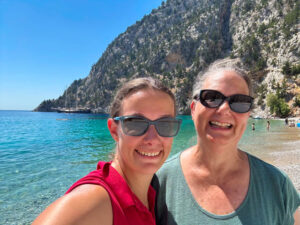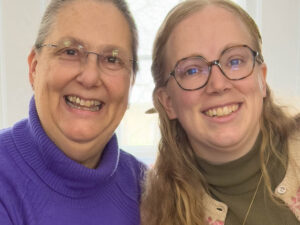
I’ve recently been speaking with some wonderful women about both parenting and homeschooling. This has underscored for me some differences in my approaches, which are serving me well. And while parenting three teenagers is not without its bumps and exasperating moments, I am not tearing my hair out, nor throwing up my hands, as some are. I am truly enjoying my teens, complete with their rough edges and not completely evolved outlooks. For me, this journey is about process, not product.
Maybe I live better with uncertainty than most, but this quality of mine is based on a habit of well placed trust, both in a God (who I understand to be all-good) and my children (who are trying to be the best they are able.) In both cases, I have built that trust from the ground up. And by my actions, I have taught these kids to trust me: I always desire the best for them and am here to serve them in any way I can. They know I am “there” for them, unconditionally.
Since very young ages, we have offered our children many choices. “Do you want to go up the stairs forward, or backwards?” Note here, that they were still going to go up the stairs, but a child reads this very differently than a command like, “Go up the stairs,” which sounds too authoritarian even to me. Subsequently, they have practiced making countless decisions, both large and small, since before they can remember, and also were allowed the consequences of those decisions.
In our homeschooling style, we do nothing without what I call “buy-in.” I don’t “top-down” tell them what they have to do for school, unless it is required by law. But I have been big about giving them the information they need to make good choices. They can choose whatever curriculum they want, but they must own up to the ramifications of those decisions.
It doesn’t take much for a kid to realize that more doors are open to them if they jump through a few hoops. When it is their choice to jump through, those very same hoops become interesting doorways to opportunities, rather than chores to chaff against. Together with them, we are constantly reevaluating, but we are only comparing their progress to their own emerging goals, not the ones we as parents might wish to inflict on them. They know they are loved regardless of what they do or don’t do.
Other than requiring them to own their own experience long before the teen years, the other thing I have done right is give them long apron strings. My oldest went by herself to Australia on money she raised at 14, and at eighteen she went on a service trip to Kenya alone after getting church members to sponsor her. My son started doing month long sleep away camp at the age of seven. Contrariwise, I know homeschooling seniors who have never been away from home, and those who have made very few decisions for themselves. Many choose junior college situations that keep them home longer than most kids. These moms are having trouble letting them go, whereas I have let mine go all along.
A kid who hasn’t been taught early to make their own choices, and hasn’t been been given opportunities to be independent and self-reliant seems bound to rebel. As a mom told me last night, “All along it has been our role to say what we will permit, and now they are telling me what they will permit.” In a different model, we’ve been working out mutual boundaries all along. Each of my kids has realized that rebelling is unnecessary because I am serving them and their ends, not trying to make them serve me or mine. Why would they dispense with their most reliable help?
In discussing parenting with these moms, one asked what each of us would want for our children on our death bed. My kids already know that answer. I want them to be happy, healthy, safe, loving, kind, employed productively, always learning, enthusiastically embracing life, enjoying and protecting what is important, as well as engaged in positive and progressive relationships. I don’t need to know or dictate the details of how that looks. These moms were uncomfortable with those wide parameters. They wanted specifics that they approved of and outcomes that they controlled.
Interestingly, what they wanted on their deathbed for their children was largely related to salvation. I understood then that the difference in our parenting styles stemmed from this. I do not feel responsible for my children’s salvation. That is between them and God and not really my business, unless they draw me into it by asking questions. God is up to the challenge of saving them, I have no doubt. I am not really responsible for them, since He is their very capable, true Father/Mother. I am merely the steward, and this understanding has made all the difference. This is why I never needed to be their authority figure, since I deferred that role – from the inception – to God.
God, in the meantime, has entrusted my husband and me as “faithful and wise stewards” of our children until their adulthood. The definition of “steward” in the Webster dictionary is: “one who manages or administers another’s property or affairs.” Their affairs are not our own, and they are God’s property, not ours. So how does one best be that “good steward”?
I would say genuine, unconditional love, two-way communication, respect of budding individuality, encouraging opportunities for growth and independence, and the early exercise of choice are what is crucial. But more than that, I recommend supporting them with prayerful, persistent acknowledgment of the all-powerful nature of their divine Father/Mother, who alone knows what is best for them. We merely need to collectively discern that step by step, eternally. We are only stewards of children.
Who doesn’t appreciate a gracious, un-presumptive hand to hold when feeling one’s way on one’s own terms?







